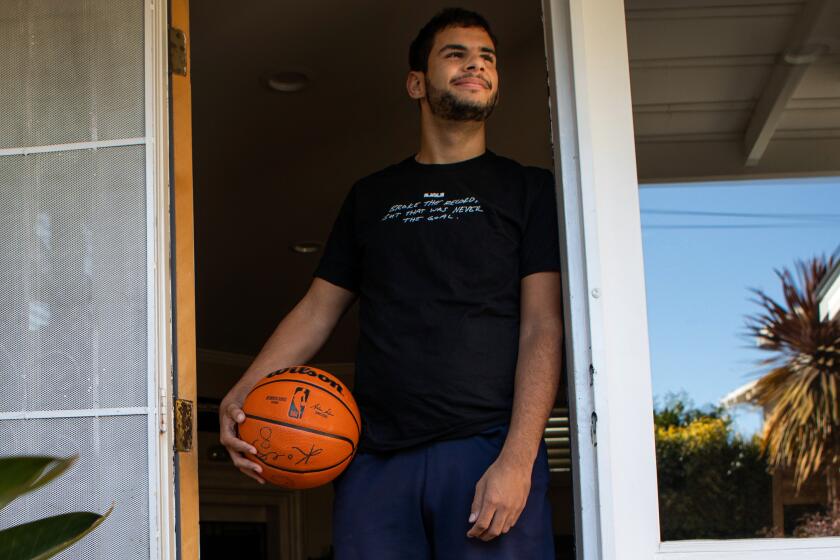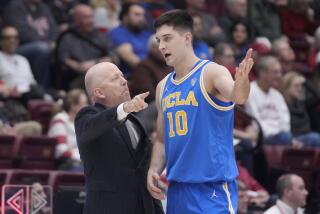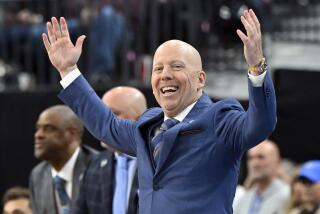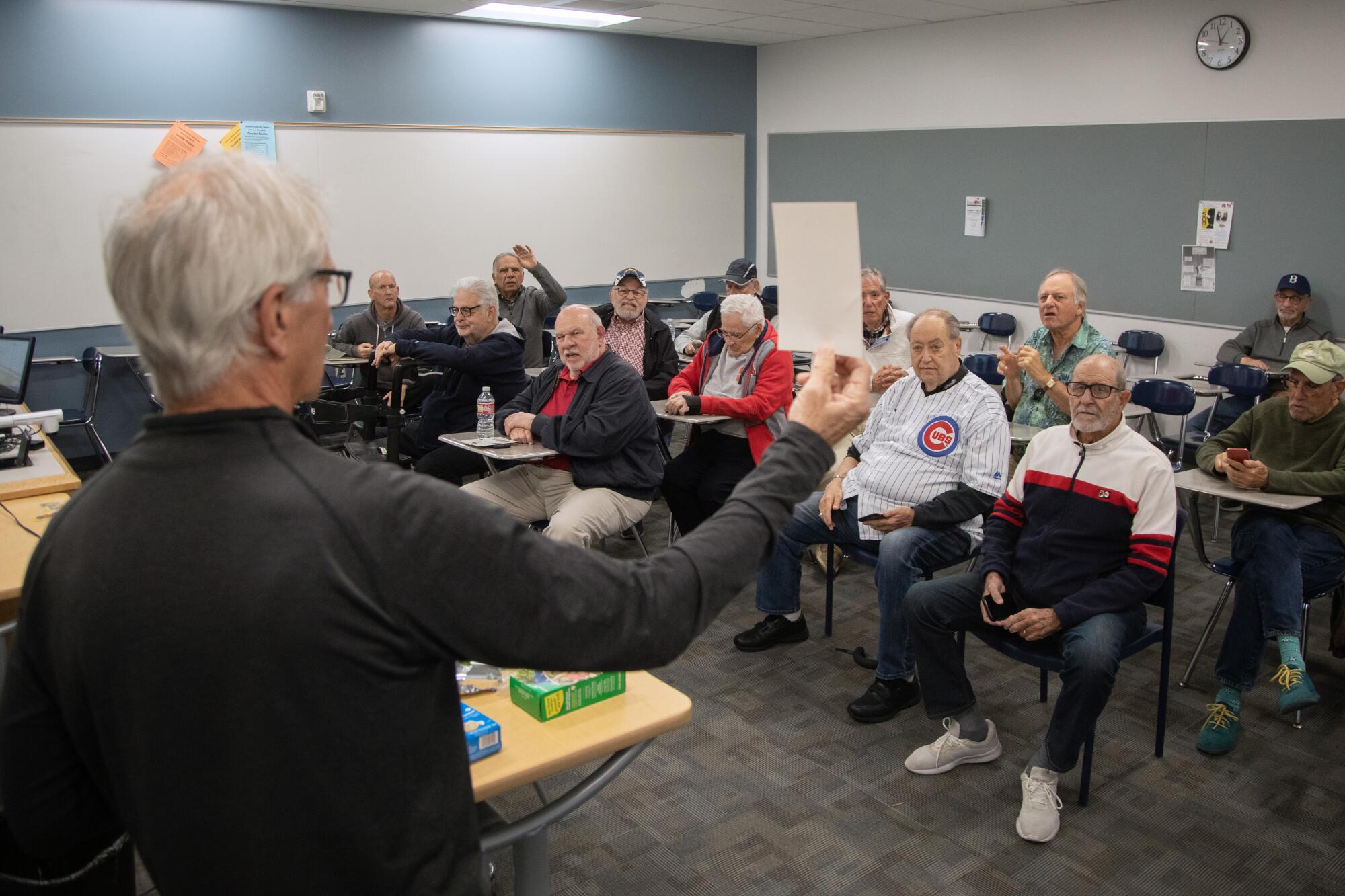
Class is in session, and the topic is the beloved LeBron James.
“LeBron is all about LeBron, he always has been, he’s absolutely not a Laker,” says Les Steier, 75.
Several desks down, Jerry Spike, 89, chimes in.
“I love LeBron the player,” he says. “I just don’t like LeBron the G.M.”
From the other side of the sterile room, the roasting continues.
“I don’t mind LeBron wanting to play with his son, I just don’t want him to do it on the Lakers,” says Gary Liebman, 80. “That’s what driveways are for!”
Basketball saved Kade West after the deaf, autistic athlete lost his mom. But other hurdles nearly derailed his athletic dreams at Cerritos College.
The students laugh and clap and move to the next subject, loud enough to be heard over hearing aids, powerful enough to rattle canes and walkers, a couple of dozen aging sports fanatics coming to life every week to poke at the heart of the Los Angeles sports landscape with unquestioned experience and unvarnished candor.
Meet the Senior Smack Talkers, a gathering of retirees who congregate in Room 1101 in the Birch building on the campus of Woodland Hills’ Pierce College every Tuesday to talk sports.
“It’s a magical experience,” says Jonathan Curtiss, 71. “It’s folks just like me coming together to act like a bunch of 8-year-olds at a baseball camp.”
Living in a world where hardball opinions are considered relevant only when offered by those who are young, Twitter-centric and talk-radio friendly, these sessions give a long-ignored demographic a chance to be heard, if only by one another.
“Most young folks don’t pay attention to what we say, we are a forgotten segment of the sport society,” says Jerry Nussbaum, 79. “But our knowledge is there as strong as ever. This gives us a chance to be part of the conversation.”
They’ve watched the Dodgers in the Coliseum. They’ve cheered the Lakers with Elgin Baylor. They had season tickets for John Wooden and front-row seats for John Robinson. They’ve been there and done that and have earned a chance to share it. These meetings give them that chance.
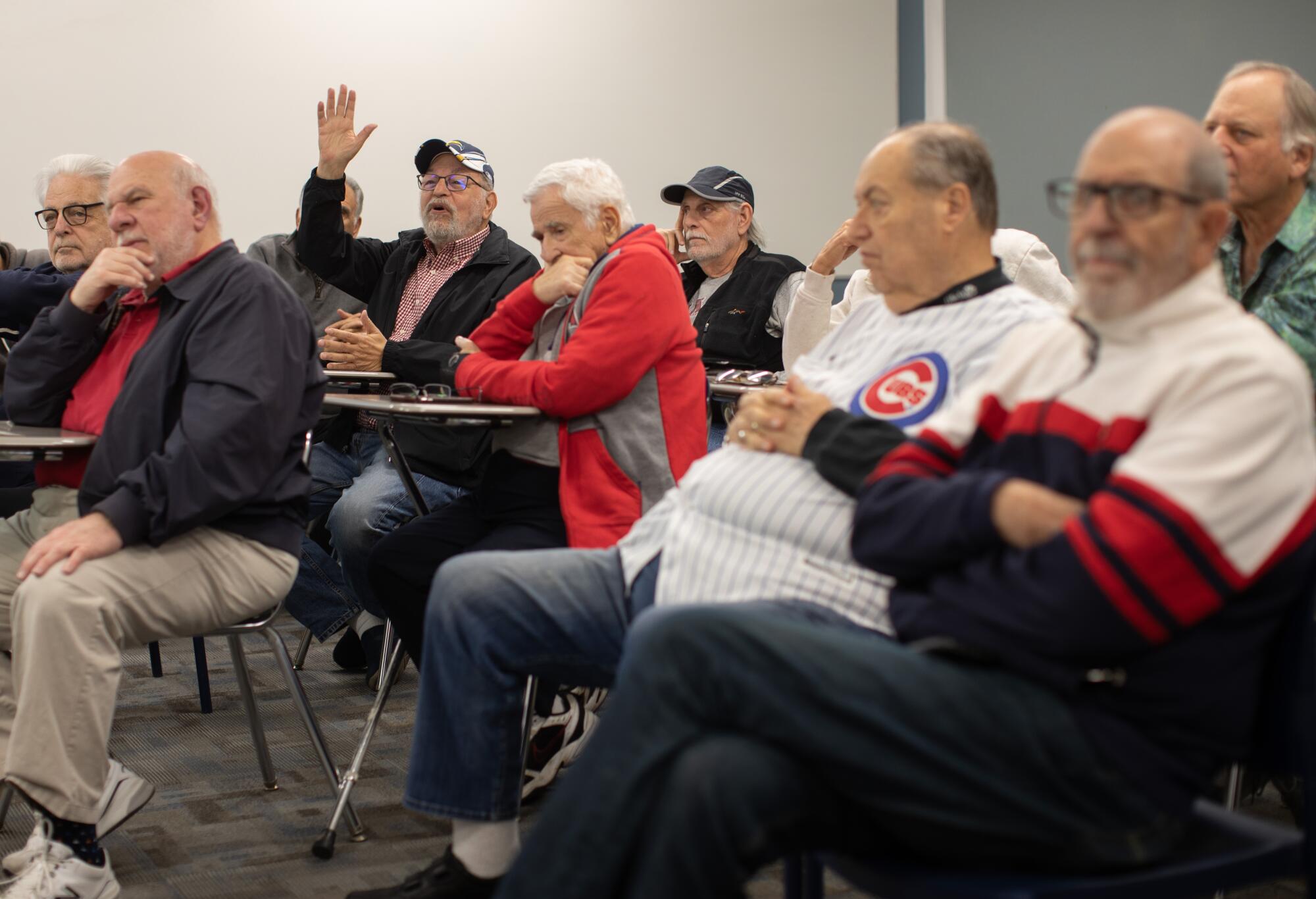
The two-hour class, which has been held for seven years, is officially called, “Current Events: Sports” and it’s part of Pierce’s older adult education program known as “Encore.” The average age of the students is about 72. The only rule is there are no rules.
There is no tuition, no grades, no quizzes, no homework, and no filter.
The students sometimes show up an hour early. They are usually still in their seats, still debating, long after the class ends. Their teacher just shakes his head, leans back in his chair, and lets them rip.
“It’s like herding cats,” adjunct professor Mark Levick says.
The most honest evaluations of this city’s sports scene have always come from its most experienced observers — if you want to know about Clayton Kershaw, talk to someone who watched Sandy Koufax — and so this columnist learned much by spending a winter afternoon eavesdropping on this sharp collection of wit and wisdom.
Class is in session, and the topic is the celebrated Dave Roberts.
“I’ve had Dodger tickets for 40 years, and I think Roberts is a terrible, terrible manager,” says Norm Becker, 77. “He makes critical mistakes in his pitching decisions. If somebody is pitching well, you leave him in a little longer.”
Dave Gurian, 75, disagrees.
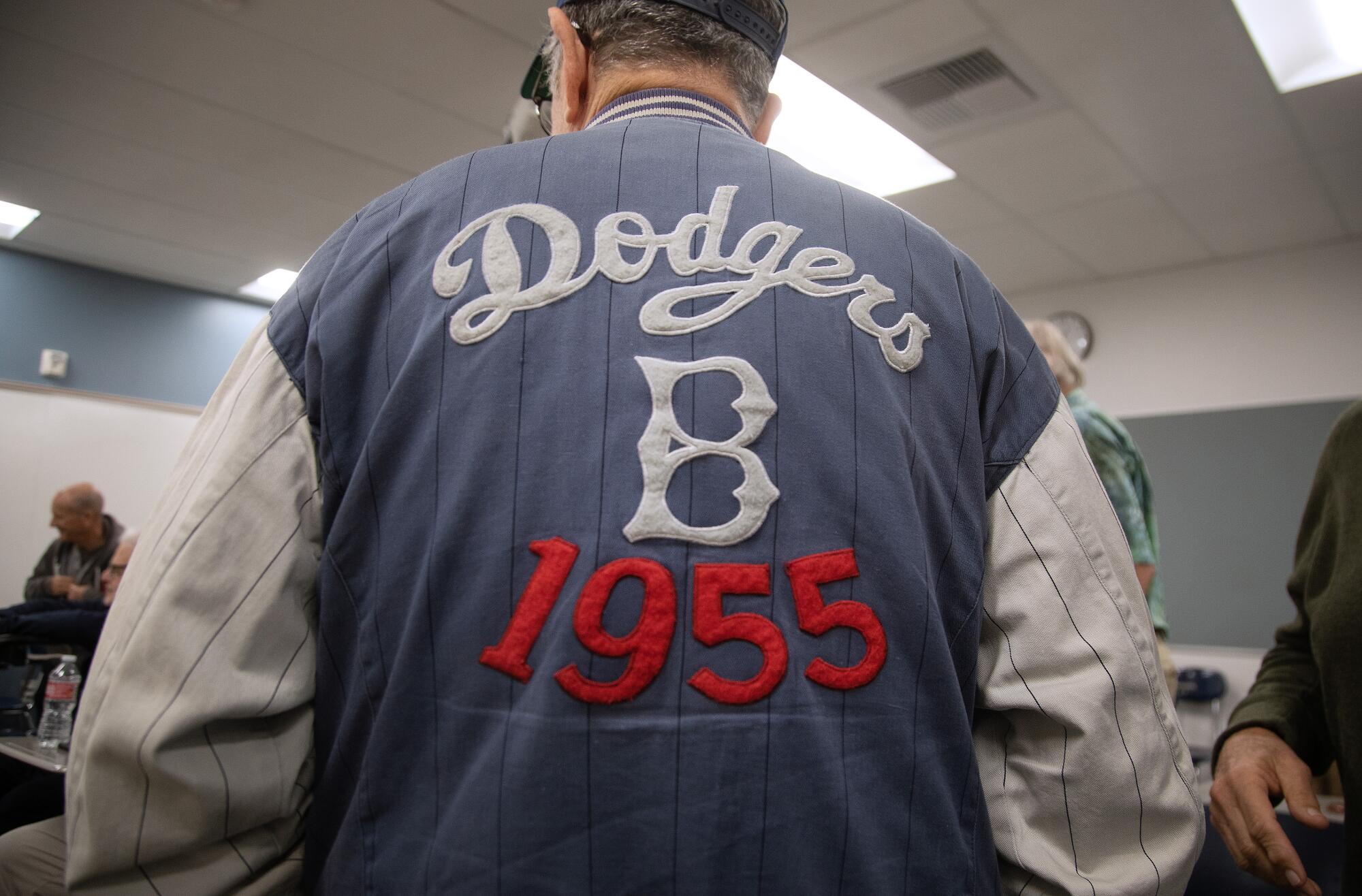
“Hey, he got them there, he’s a players manager, they love him, he’s not going to be right all the time, he says blame him, and I appreciate that,” Gurian says. “What manager anywhere right now has done better than Dave Roberts?”
Becker counters.
“Everything seems predetermined, it’s all analytics, I don’t know what happens in that dugout,” he says.
Jay Goldberg, 82, ends it.
“What’s the point of even having a manager if he’s not managing?” he says.
They argue, but they bond. Their opinions are pointed, but their embrace is huge. Finding great joy in discovering a common outlet at their advanced age, these strangers have become family. The class largely comprises men, and studies show senior men don’t bond as easily as their female counterparts, which makes these two hours about something far more important than sports.
For retirees in search of a connection, this class has bestowed upon them a grand slam of friendships.
“At my age I never thought I’d say this, but meeting my classmates changed my life,” Steier says. “It’s given me a new outlook and perspective. It’s transformed me.”
Some of the students meet for lunch before class, then meet again at a restaurant after class. They gather at Genesta Park on Fridays. They have dinners with their spouses and partners on the weekends. They connect in a way they thought they would never again connect.
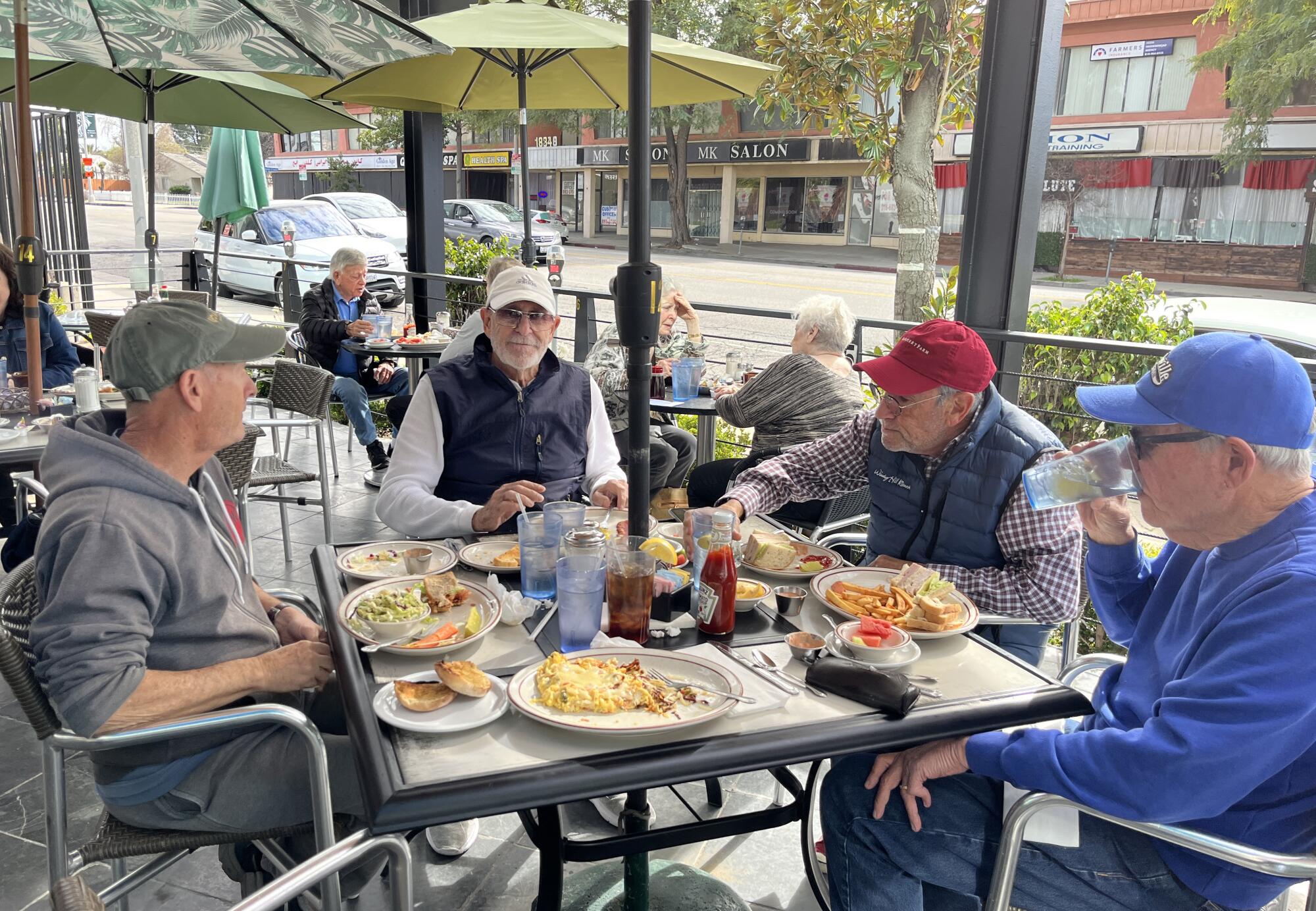
“Six months into retirement, I was going crazy,” says Curtiss, a former tech manager at UCLA. “I was bored and kind of depressed. It’s hard for me to develop new close friendships. But this changed my life. It’s given me new friends. Tuesday is my favorite day of the week. It’s a miracle.”
Ann Gurian, wife of Dave Gurian, cheers for the sports fanatics.
“Truthfully it’s really good for Dave,” she says. “Women tell their problems to each other, men don’t, but these guys are different. They have discussions about everything. Dave can’t wait to leave me each week, he’s so happy.”
They walk together. They attend Super Bowl parties together. They text one another during big games. And through all the talk of UCLA hoops and USC football and Trevor Bauer, they wind up sharing real life concerns. Health, family, savings, stuff that men rarely share, they discuss as if it were a controversial foul call.
They’ve attended funerals together for the several class members who have died. They had long discussions on cancers that the class members have endured.
“We create friendships that could not have been created under any other circumstance,” says Nussbaum, who credits the group with helping him with his heart issues. “When I needed them, the group was there for me. It’s become about a lot more than sports.”
Then there’s his one shining moment, when Nussbaum passes a wide-eyed 18-year-old while making the long trek to Room 1101 from the parking lot.
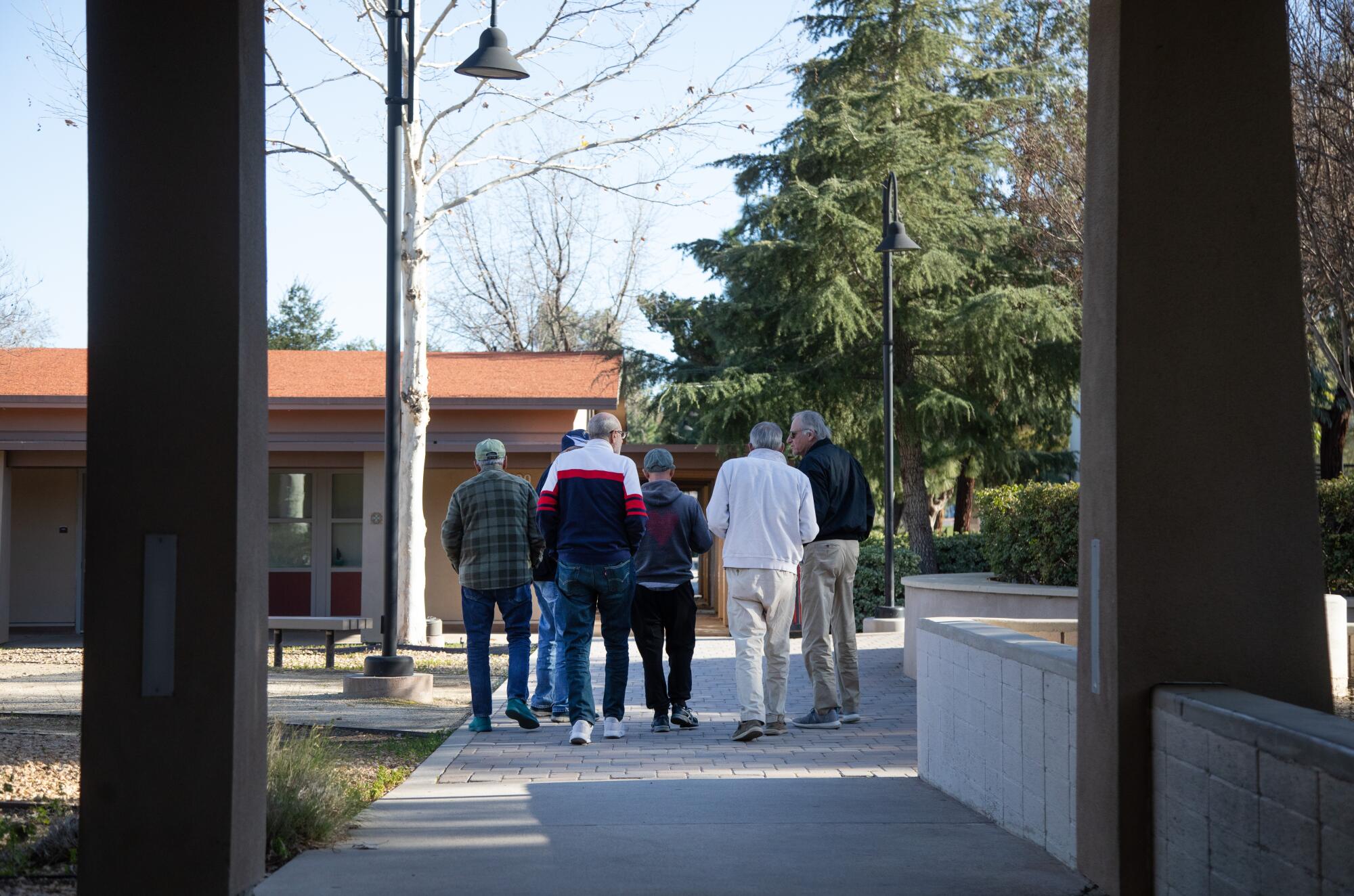
“They’ll look at me like, ‘You’re still in class?’” Nussbaum says. “I just smile. They have no idea.”
Class is in session, and the topic is Mick Cronin.
“Mick is the best coach since Wooden, but his antics on the court bother me a lot,” Nussbaum says. “A kid makes one tiny mistake and he’ll scream holy hell at the guy. Somebody screaming at me I’d have a hard time getting over it.”
Curtiss jumps in.
“This doesn’t mean we want him gone, I just don’t like the fact he’s screaming at his players on national television, they represent the school very well,” he says.
Fred Krimm, 89, a UCLA season ticket-holder for 57 consecutive years, offers a conclusion.
“I think Mick Cronin is one of best basketball coaches and one of the worst human beings,” he says. “It’s amazing his kids love him. I hear comments from people who sit behind him on the UCLA bench, they talk of his vile comments, he always seems to look at the glass half empty. As a coach, he does incredible things. As a human being, he doesn’t come up to my standard.”
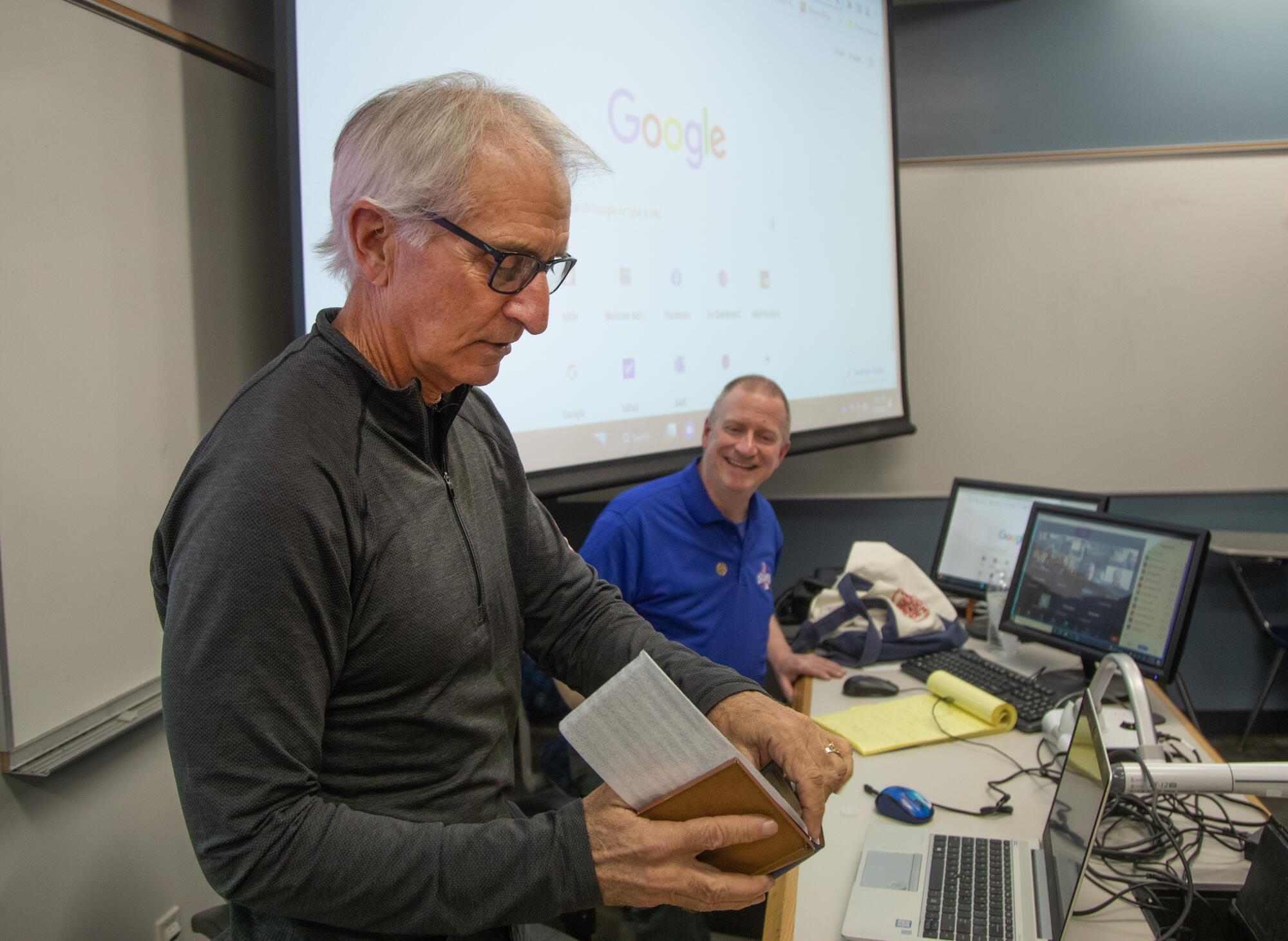
Speaking on a Zoom feed that accompanies every class, Carol Silver draws the conclusion.
“I’m not happy with Mick Cronin’s antics, you cannot demean young men or women and use that language in public,” she says. “John Wooden is rolling over in his grave. I’ve known 10-year-olds with better demeanor. Of course, his players love him. He’s their ticket to where they want to go.”
You hear that Mick? Unquestioned experience and unvarnished candor. You want more of it? Drop by and say hello. Pierce College, Birch 1101, Tuesdays at 1 p.m.
In fact, all Southern California sports leaders should make it a point to visit the Senior Smack Talkers, listen to their experience, tap into their knowledge.
Old school. Fresh takes. Magical.
More to Read
Go beyond the scoreboard
Get the latest on L.A.'s teams in the daily Sports Report newsletter.
You may occasionally receive promotional content from the Los Angeles Times.

